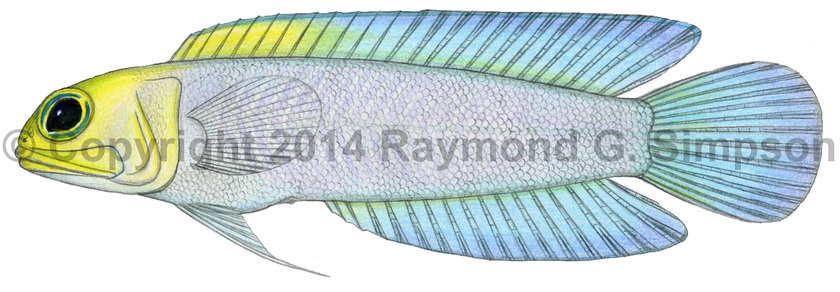
Common Name
Yellowhead Jawfish
Year Described
Jordan & Thompson, 1905
Identification
Dorsal Fin: XI, 15-17
Anal Fin: III, 14-17
Pelvic Fin: I, 5
Pectoral Fin: 18-21
Gill Rakers: 40-62 (lower limb of first arch)
Vertebrae: 10 precaudal, 15-17 caudal; 25-27 total
Maxilla of males without thin, flexible posterior extension. Jaws huge; reaching well past rear margin of orbit. Premaxillary and dentary with teeth. Vomer with 0-2 teeth. Lateral line extends posteriorly to between 5th and 8th segmented dorsal ray. Nape, head, pectoral base, and area above lateral line scaleless. Rest of body fully scaled. Lateral scale rows: 81-94. Dorsal fin spines slender with sharp, flexible tips. Anterior nostril without a cirrus. Median fins broad and rounded. Pelvic fin very elongate. Caudal fin large and rounded.
Color
Body pearly white with faint blue to turquoise hues, and faint white chevrons on mid-side. Head pale to bright yellowish anterior to gill cover. No blue line markings on head. Eye with blue ring on iris. Anterior dorsal fin turquoise, grading to bright blue rearward. Rest of fins bright blue. Pectoral fin whitish.
Size
Maximum size to 97mm SL.
Habitat
A shallow water jawfish living in sandy bottoms and rubble zones near reefs up to 59m. Hovers vertically over burrows in substrate.
Range
Southern Florida and the Gulf of Mexico to the central Caribbean islands.
References
Böhlke, J.E. 1967. A new sexually dimorphic jawfish (Opistognathus; Opistognathidae) from the Bahamas. Notulae Naturae (Philadelphia) No. 407: 1-12.
Smith-Vaniz, W. F. 1997. Five new species of jawfishes (Opistognathus: Opistognathidae) from the western Atlantic Ocean. Bulletin of Marine Science v. 60 (3): 1074-1128.
Other Notes
It is not clear whether this species and the undescribed Bluebar Jawfish overlap in range in the southern Caribbean. Many records of this species in the southern Caribbean may be the undescribed form.